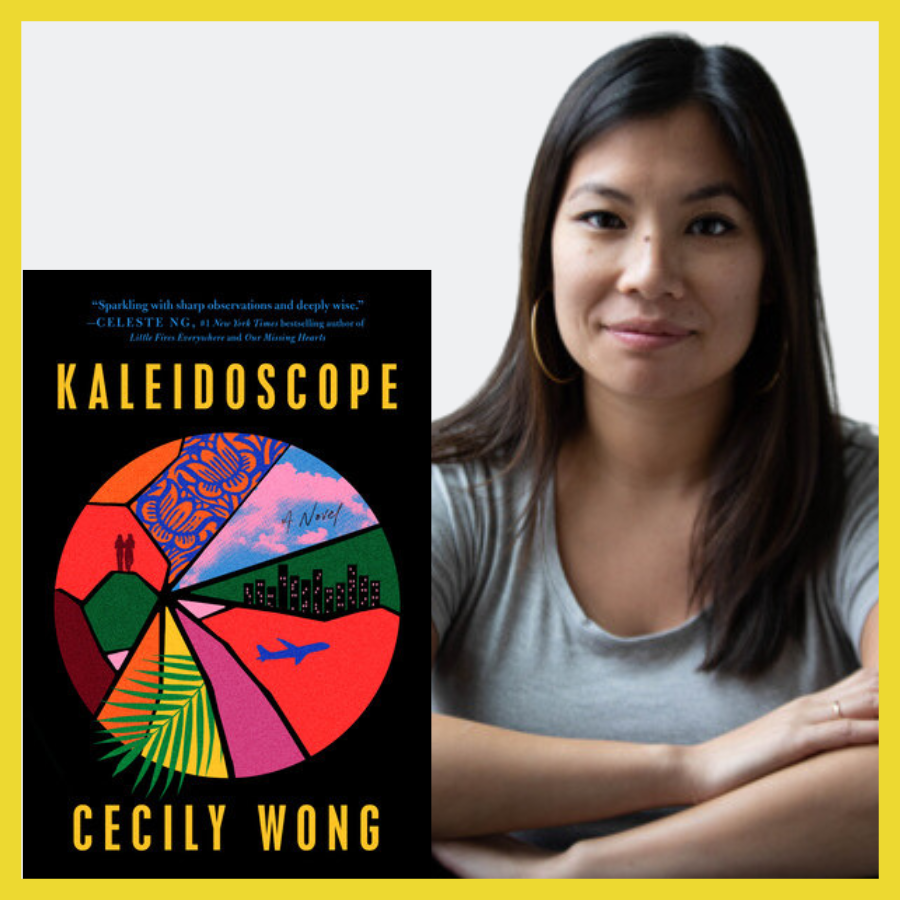This post may include affiliate links, which means we make a small commission on any sales. This commission helps Feminist Book Club pay our contributors, so thanks for supporting small, independent media!
Kaleidoscope was the perfect name for the novel by Cecily Wong. It was colorful in sights, smells, tastes, and emotions. For me, it was a reading experience that engaged all my senses.
I got a chance to ask the author some questions about her writing experience. You can see our conversation below!
What inspired you to write Kaleidoscope?
Kaleidoscope began as an ode to my twenties—to all those explosive first experiences that happen when you finally strike out on your own. First love. First loss. First encounters with travel and independence and heartbreak. And gradually it morphed into an exploration of how
people reshape themselves when they leave the orbit of family and start to question the narratives that, in some form, we all inherit about ourselves. I was working through these growing pains myself, and I wanted to tell a story that massaged the tension between who we’re told we are, and who we want to be.
Riley is such a dynamic character. What inspired you to write her, and how do you approach creating such a memorable character? Would you consider Riley a feminist?
Thank you! Riley is an amalgamation of many women I’ve loved throughout my life. She’s brainy, ambitious, sarcastic, and loyal. She has this very clear inner compass that I really admire in a person; she guides herself, even when it makes her lonely and self-conscious. And she’s absolutely a feminist. Riley goes to Barnard, she’s an abortion advocate, she’s the only person to denounce a problematic male character with outsized power, even when her mother won’t. She’s the strongest character in this book, hands down.
What was your favorite part about writing Kaleidoscope? What was the most challenging part for you when writing Kaleidoscope?
I love writing scenes that allow me to dig deep into a personal memory or a feeling in time. I loved writing the nine-month trip that Riley takes around the world. I loved writing Riley walking around New York, listening to music and people-watching. Endings are always tricky for me. I love novels because of their messy, sprawling, ambiguous nature, and so crafting an ending that’s both satisfying and true to life always feels tremendously challenging—but I do my best!
Kaleidoscope takes us on a trip around the world. Did you do any research on the different places? What was your process like to capture all the sights, smells, tastes, and experiences?
In 2014, I took a nine-month backpacking trip that really exploded my life, and I became obsessed with trying to work the experience into a novel. I think extended travel, and the dislocation that comes with it, is such an interesting and visceral way to crack a person open. I wanted to strip my characters of their routines and comforts, launch them out into the unknown, and see what happened. I also had about a hundred pages of notes from my trip—those sights, smells, and tastes—that I was dying to use, and it made writing that section really fun.
Love and loss were big themes for me in this book. Do you think the two are intertwined? Why or why not?
I think that love and loss can exist alone, but they become more meaningful, increasingly powerful, when affected by the other. Loss gives you gratitude for love. Love acts as a salve for loss. When we lose things, we can’t help but cherish what we had, or what we still have. When we love, we feel loss more acutely. They amplify each other, and I think this mutual amplification is what really fascinated me in Kaleidoscope.
What do you hope readers will take away from your book? Is there a particular message or feeling you want to leave them with?
Riley goes through darkness and grief in order to gain clarity about who she is. I hope readers will leave the book with what Riley earns through this experience, which to me is self-acceptance, perspective, and compassion. I want this to be a book that expands a reader’s sense of self, and expands their sense of the world. But I also like to think that, despite the darkness and grief, this book can be quite fun. There’s travel and romance and a sense of humor, and I hope readers find joy in the levity as well.
What is a book that has stayed with you recently? Are there any authors who have influenced your work?
I’ve been reading a lot of short novels this year. Recently, I’ve enjoyed Telephone by Percival Everett, which is so smart and funny while also being devastating, and NP by Banana Yoshimoto, who writes the weirdest, most memorable novels. As far as authors who have influenced me, I love Jhumpa Lahiri, Elena Ferrante, and Moshin Hamid—all writers who got me writing, and whose work keeps me writing.
Where can people find you and your work online?
I’m on Instagram at @hellocecilywong and I have a website: cecilywong.com


